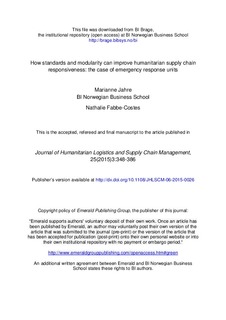How standards and modularity can improve humanitarian supply chain responsiveness: the case of emergency response units
Journal article, Peer reviewed
Permanent lenke
http://hdl.handle.net/11250/2374320Utgivelsesdato
2015Metadata
Vis full innførselSamlinger
- Scientific articles [2181]
Originalversjon
Journal of Humanitarian Logistics and Supply Chain Management, 5(2015)3: 348-386 http://dx.doi.org/10.1108/JHLSCM-06-2015-0026Sammendrag
Purpose of this paper
This paper aims to increase understanding of the use of standards and modularity for improving responsiveness in the humanitarian context.
Design/methodology/approach
Based on a conceptual framework and a systematic literature review, we conducted a longitudinal, explorative case on the Emergency Response Unit (ERU) concept in the International Federation of Red Cross Red Crescent Society (IFRC), focusing particularly on the Health ERU in the Norwegian Red Cross.
Findings
The ERU concept makes use of many types of standards that complement and influence each other, and the focus on modularity is increasing due to a growing need for responsiveness. The main challenges are the trade-offs between autonomy and adaptability to the context; these have resulted in more modularization, which may be in danger of breaking the concept.
Research limitations/implications
Results from this study could be refined by surveying staff involved in all types of ERU deployments. Further studies should explore the generalizability of the findings and test the developed propositions.
Practical implications (if applicable)
The study provides greater understanding of the use of standards and modularity for improving responsiveness. Practitioners can use the framework as a check-list to identify potential means for improvements. The case can be used for training, discussions, and reflections. The research feeds into IFRC’s and the Norwegian Red Cross ongoing work on their global response tools.
Societal implications
The results of the study can support improvements in humanitarian supply chains, thereby providing affected people with rapid, cost-efficient, and better-adapted responses.
What is original/value of paper
We have developed a framework for categorization of standards and modularity in the humanitarian context. This is the first empirical study of how humanitarian organizations use standards and modularity to improve responsiveness. The paper concludes with a set of propositions on how the concepts are linked.
Beskrivelse
This is the authors' accepted and refereed manuscript to the article
